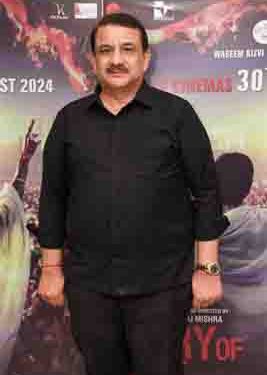- Calcutta HC refused to stay movie’s release, saying criticism is expected in a healthy democratic setup
- The film, which has already garnered significant attention for its unflinching portrayal of the stark realities surrounding Rohingya refugees, illegal infiltration, and the fiery debate on ‘Love Jihad,’ hit theatres nationwide on August 30
- in Kolkata, theatres have declined to show the film, citing fears of severe repercussions from West Bengal’s Chief Minister, Mamta Banerjee
NE ENTERTAINMENT BUREAU
Jitendra Narayan Singh, the producer of the much-anticipated film The Diary of West Bengal, has publicly criticized cinema owners in Kolkata for their refusal to screen his film. He alleges that these theatres are succumbing to external pressures, particularly from political forces and West Bengal’s Chief Minister, Mamta Banerjee and are unwilling to showcase a film that delves into sensitive yet pressing issues. The film was scheduled for releasing on the 30th of August.
The film, which has already garnered significant attention for its unflinching portrayal of the stark realities surrounding Rohingya refugees, illegal infiltration, and the fiery debate on ‘Love Jihad,’ is set to hit theatres nationwide. However, Singh claims that in Kolkata, theatres have declined to show the film, citing fears of severe repercussions from West Bengal’s Chief Minister, Mamta Banerjee. “The Diary of West Bengal” offers a bold narrative that brings to light the challenges faced by the region.
Jitendra Narayan Singh expressed his deep disappointment, stating, “It is disheartening to see that cinema, a platform meant for free expression and the dissemination of truth, is being stifled by political fear. The people of Kolkata deserve to see this film and decide for themselves the weight of its message. By refusing to screen The Diary of West Bengal, these theatre owners are denying their audiences the opportunity to engage with a story that impacts their very lives”_
The producer emphasized that the film intends to shed light on critical social issues that have long been ignored or overlooked. He urged the public to stand against such censorship and to seek out the film in other venues or platforms where it will be available.
Directed and written by Sanoj Mishra, the movie released Friday is set in the backdrop of 1971 Bangladesh Liberation War, tracing the story a Hindu widow’s life in West Bengal where she arrives.
Despite these challenges, The Diary of West Bengal was released nationwide on August 30, 2024, and the producer remains committed to ensuring that the film’s message reaches audiences far and wide.
Calcutta HC refused to stay movie’s release
In his PIL objecting to the release of ‘The Diary of West Bengal’, the petitioner had contended that the Sanoj Mishra directed movie had communal undertones as depicted in lines like ‘Mamata’s love for Rohingya Muslims is letting the Hindus go homeless’.
One of the characters in the film’s teaser further can be seen to utter the words ‘Bengal is becoming a lot like Kashmir,’ the petitioner said.
But, the Calcutta High Court refused to stay the release of the movie, saying that criticism is expected in a healthy democratic setup.
“We are in a democratic setup and any healthy criticism by way of a biopic, I don’t know. If suppose X,Y and Z are said to have been criticised in the movie, if they are aggrieved, let them come! Where are we heading to? There are a lot of serious issues to deal with,” Chief Justice Chief Justice T. S. Sivagnanam of Calcutta High Court remarked Thursday, while citing previous Supreme Court judgments that refused to ban the release of films, books, or dramas.
“West Bengal is a tolerant society. All citizens of West Bengal for years together have undergone pain. They have become sort of immune to the system. Where are we heading to? We will have a lengthy hearing. No one is compelling you to read the book or see the movie, don’t like it shut the book. Don’t purchase a ticket to see the movie,” Chief Justice Sivagnanam said.
The Calcutta HC has now listed the matter for hearing after three weeks.










